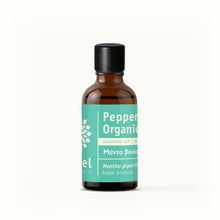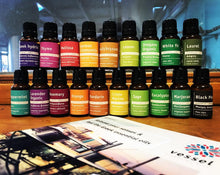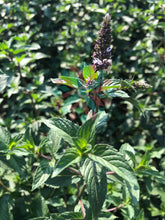Greek Peppermint Organic Essential Oil
Regular price
€7.70
€7.70
Sale
If you are interested in buying larger size quantities we would love to receive your email at info@vessel.gr
Greek Peppermint Essential Oil
Batch: E1001557, E1002052



PEPPERMINT
Botanical name: Mentha x piperita
Botanical family: Lamiaceae (Labiatae)
Method of extraction: Steam distillation
Plant part used to extract the oil: Leaves and flowers
Area of origin: Greece
Peppermint is a hybrid mint, a cross between watermint (Mentha aquatica) and spearmint (Mentha spicata). It is indigenous to Europe and the Middle East. In the wild it is often found growing together with its parent species.
Peppermint is a hybrid mint, a cross between watermint (Mentha aquatica) and spearmint (Mentha spicata). It is indigenous to Europe and the Middle East. In the wild it is often found growing together with its parent species.
Historical notes:
The genus ‘Mentha’ was named after the Greek nymph Minthe. Legend has it that Minthe was the lover of Hades, the God of the Greek underworld. When Queen Persephone (Hades’s wife) heard of the affair, she metamorphosed Minthe, into the garden mint, which some call ‘hedyosmon’ (lit. 'sweet-smelling'). Some versions of the myth are much more gruesome and claim that Persephone killed Minthe in a fit of rage and jealousy and that Hades brought her back to life as a fragrant herb.
Peppermint has a long history of uses. Aristotle (circa 384-322 BCE) referenced peppermint in his writings as an aphrodisiac. Alexander the Great (356-323 BCE) a king (‘basileus’) of the ancient Greek kingdom of Macedon, forbade his soldiers to have peppermint because it was thought to promote erotic thoughts and deplete soldiers of the desire to fight.
Pliny the Elder (23 – 79AD), a Greek writer and encyclopaedist, wrote that Greeks and Romans used peppermint to adorn themselves and to adorn their dinner tables at feasts, and that their cooks used it to flavour wines and sauces.
Biochemical group: Ketone
Main chemical compounds: menthone, menthol, limonene, menthyl acetate, 1,8-cineole, neomenthol, isomenthone, menthofuran, others
Colour: clear
Consistency: thin
Aroma strength: strong
Perfumery note: top
Aroma: fresh, characteristic minty aroma, strong and uplifting, cooling, reminiscent of mint sweets, with a warmer herby note as the dry out progresses
Traditional aromatherapy uses:
- Traditionally in aromatherapy treatments peppermint essential oil is associated with the following therapeutic properties: analgesic, antibacterial, anti-depressant, anti-inflammatory, antiemetic, antifungal, antimicrobial, antiphlogistic, antipruritic, antiseptic, antispasmodic, antiviral, astringent, carminative, cephalic, decongestant, digestive, emmenagogue, energising, expectorant, febrifuge, hepatic, nervine, stomachic, sudorific, vasoconstrictor.
- Qualified aromatherapists may use peppermint essential oil for common complaints such as:
- skin conditions: itching, acne, cooling
- respiratory issues: sinus congestion and inflammation in colds and flu, congestion related headaches
- digestive issues: nausea, flatulence, cramping indigestion with intestinal spasms and pain, liver support, travel sickness, digestion related headaches
- pain relief: muscular and joint pain, backache (lumbago), headaches/migraines, intestinal spasms
- mental sharpness, focus and concentration, to stay alert
- others
- How we use it:
Please, also see our How to Use Essential Oils Safely page for more information.
- For a foot cream - add together with our Lavender essential oil to an unscented base cream for a cooling, soothing experience. Please note that the aroma of Peppermint is very strong and it will ‘overtake’ blends easily. It is also worth noting that Peppermint oil has been found to be successful in soothing itchy conditions but only when used at a dilution below 1%
- For a sinus congestion or a headache – simply apply a drop of peppermint essential oil to a tissue and inhale
- To support digestion or ease flatulence – dilute in a fixed oil (carrier oil) and massage the lower abdomen or specific muscle areas. Try adding some Mandarin essential oil or Sweet orange essential oil for a sweeter, gentler aroma if you prefer. For nausea/motion sickness simply inhale a drop of peppermint essential oil from a tissue. Try adding some Lemon essential oil for a ‘kinder’ but still fresh aroma.
- As a ‘pick me up’, to improve alertness – simply apply a drop of peppermint essential oil to a tissue and inhale
Safety considerations:
Tisserand and Young indicate that peppermint essential oil presents a low risk as a mucous membrane irritant but it is choleretic and can pose a risk of neurotoxicity. They recommend a maximum dermal use level of 5.4% and state that it should be avoided in instance of cardiac fibrillation and by those with a G6PD deficiency. Do not apply near the face of infants/children. Reading Tisserand and Young's full profile is recommended. [Robert Tisserand and Rodney Young, ‘Essential Oil Safety’ (Second Edition. United Kingdom: Churchill Livingstone Elsevier, 2014), 387].
Please, also see our How to Use Essential Oils Safely page for more information.
Research and studies:
- The influence of essential oils on human attention. I: alertness
https://www.ncbi.nlm.nih.gov/pubmed/11287383
- Inhibition by the essential oils of peppermint and spearmint of the growth of pathogenic bacteria.
https://www.ncbi.nlm.nih.gov/pubmed/11549238
- Virucidal effect of peppermint oil on the enveloped viruses herpes simplex virus type 1 and type 2 in vitro.
https://www.ncbi.nlm.nih.gov/pubmed/13678235
- Peppermint Oil Promotes Hair Growth without Toxic Signs.
https://www.ncbi.nlm.nih.gov/pubmed/25584150
- Effect of inhaled essential oils on mental exhaustion and moderate burnout: a small pilot study.
https://www.ncbi.nlm.nih.gov/pubmed/23140115
Margaret Pawlaczyk-Karlinski MSc. (Hons.), Cert. Ed., M.I.F.A., NHS reg.









